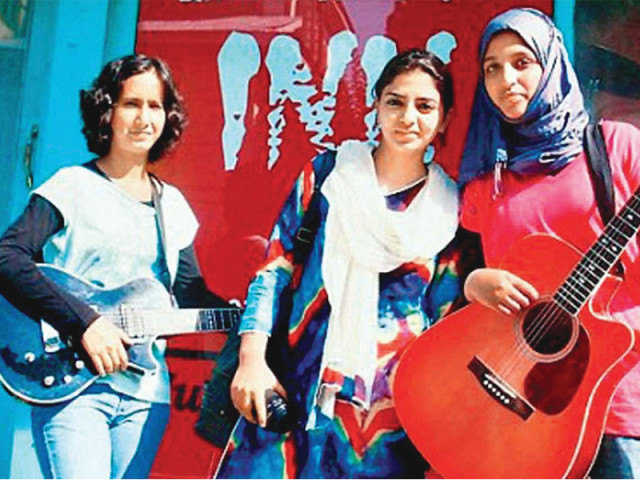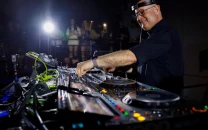Pragaash band: Girl Band Sufi
Kashmir’s only all-girl mystical music group risks falling silent .

(Above and below) The first girl band of Kashmir, Pragaash, was formed in 2012 but broke up a year later after receiving threats.
While Shaista breathes life into the sitar and the stringed Kashmiri santoor, Naseema thrums on the tabla as Ayesha creates magic on the dhokra drum. Musical interludes follow touching praises of Prophet Mohammad (PBUH) in the tranquil voices of the young girls. Within no time, the otherwise silent derelict room fills with sufi music, now facing extinction in Kashmir.

The first girl band of Kashmir, Pragaash, was formed in 2012 but broke up a year later after receiving threats.
With state government and civil society failing to preserve the heritage of the traditional sufi music of the valley, this group of five girls is striving to keep the art alive. Besides taking part in local and national events such as the state sufi music festivals and events of the Sangeet Natak Academy, they have worked for Indian film-maker Muzaffar Ali and theater director MK Raina. The girls are determined to pass on the tradition to the next generation.

“In this century, our youth are turning to western music like the Beatles, the Backstreet Boys [and] Michael Jackson besides being drawn to Bollywood music. But our culture is different from it. We cannot forget our rich heritage and adopt the culture of other countries,” says 24-year-old Shaista, the group leader of the valley’s sole woman sufi group. A group with no formal name.
Shaista was a mere 11 years old when she started taking lessons in sufi music from the valley’s veteran sufi artist, Mohammad Yaqoob Sheikh. The grandson of one of the most revered names, the late Ghulam Mohammad Qaleenbaaf, Sheikh is one of the few teachers and artists left here. He is reputed for his individual contribution in keeping this art alive by training young talent and is a recipient of many state and national awards.

(Top) The santoor, (bottom left) the tabla and (bottom right) the sitar.
“My grandmother was a spiritual person and loved sufi music. Because of her, my family was inclined towards sufism which is why my parents sent me to learn it,” says Shaista.
With time, Shaista became well versed in the sitar, santoor and even singing. She invited more girls to join the group. However, she could not continue with her education after grade 12 due to financial constraints.
Sheikh would teach the girls free every day. But despite these efforts, the group did not survive beyond two years. “The girls in my group got married after which they did not continue with singing. Out of six girls, I was the only one left.” The dearth of job opportunities in the field further contributed to the split.

A group of musicians performing sufi music in Kashmir, featuring the sitar and Kashmiri santoor, a 100-string hammer dulcimer with a range of three octaves that is played with a mallet.
This did not discourage Shaista (then 14). She went out and pitched to other friends and roped them in to form a new group of four more girls. Sheikh started training this new batch and they proved to be more talented and dedicated than the previous one.
“I have learned sufi music for six years. My soul is in it and I shall continue to learn and teach it as far as I am alive,” says Naseema, 21, who started training at the age of 12.
Hailing from a poor family of Budgam, Naseema could not pursue her studies beyond class 11 either. Her father does manual labour to feed the family of six. Yet she is determined to continue singing. “I am from [a] poor family and cannot do much. I feel it is my duty to pass on this art to [the] next generation. I am training my little cousins how to play the tabla and sing,” she adds.
Twenty-year-old Ayesha dreams of setting up an institute for teaching sufi music but this won’t be possible without funding. “All those who know sufi music this time share the responsibility to preserve it,” she says. “We are among them.”
Ayesha says their group works hard and performs well in programmes. “We ensure we participate in events so that people are encouraged to take up this art. At a time when scores of upcoming artists have quit sufi music, our performance is contributing to keep it alive.”
All the artists of the group are certified or approved by Radio Kashmir, Doordarshan, India’s Sangeet Natak Academy, the Jammu and Kashmir Academy of Art, and Cultural and Languages and have been recognised by several private national art groups.
Kashmir has a long tradition of sufi music. The 600-year-old spiritual art form came to the valley from Central Asia in the 15th century. It grew as a popular means of entertainment. It is primarily Persian and Kashmiri vocal and choral music performed by an ensemble of four to seven musicians led by one. The work of the great mystics of Persia and Kashmir such as Hafiz, Jalaluddin Rumi, Jami, Omar Khayam, Amir Khusrau, Rasul Mir and Neame Seab form the corpus, according to the extensive website on the topic, kashmirsufiana.com.

Despite this long history, not more than five to six sufi music teachers exist in Kashmir today. And only 20 to 30 people know the art. Kashmir has only one existing master of sufi music, Ghulam Mohammad Saznawaz. “Out of 180 melodies and ragas which find reference in ancient scriptures, 138 are lost,” Sheikh told The Express Tribune. The remaining 42 melodies are preserved by the legendary Sheikh Abdul Aziz in his musical notation ‘Kashur Sargam’ meaning Kashmiri melody.
“It hurts to see sufi music dying. Only [a] countable number of sufi music artists are with us now. Many of them are elderly,” says Sheikh.
One of the major factors is a lack of state patronage, which is why boys tend to be discouraged from taking up this art as a career. “With my own money and efforts I have been training boys and girls so that it [sufi music] is preserved. But after working hard for seven to eight years, they get no jobs, no career. They struggle for money and finally they quit,” he explains.
It would have certainly helped to have state-sponsored music schools or formal music courses in educational institutions, which could generate employment and interest. “Our youth love[s] music but they either have to leave Kashmir for it or quit,” he laments. He dreads the same will happen with the girls if their work is not recognised.
There is only one precedent for this kind of cultural effort: the Pragaash band, the first all-girl rock band in Kashmir. The three teenage girls got together in 2012 and performed publically for the first time in December 2012 at a ‘Battle of the Bands’ competition where they received the award for best performance.
Soon after the event, though, men threatened the girls with rape and death over the phone and social media (Facebook). It did not help that in February this year, the grand mufti of Kashmir issued a fatwa against the group, stating that music was “not good for society” and that all “bad things happening in Indian society were because of music”. Following the fatwa and condemnation from wide sections of society the pressure proved too much to bear and group publically decided to quit. Sheikh just hopes that the young sufi musicians won’t meet the same fate.
*Names have been changed to protect identities.
Published in The Express Tribune, Sunday Magazine, August 11th, 2013.
Like Express Tribune Magazine on Facebook, follow @ETribuneMag on Twitter to stay informed and join the conversation.



















COMMENTS
Comments are moderated and generally will be posted if they are on-topic and not abusive.
For more information, please see our Comments FAQ